
Export to South Korea 2025: strategic guide to an evolving marketplace
Summary
The article analyzes the opportunities and challenges for Italian companies interested in the’export to South Korea in 2025. Starting from a solid data base that confirms Italy as the 19th supplier in the world with a growing trade balance, the text explores the most successful sectors for Made in Italy. Detailed analysis is offered for sectors such as fashion and leather goods, where Italy is a leader, and for agribusiness, cosmetics and instrumental mechanics, highlighting their potential and specific entry strategies.
In addition to traditional sectors, the in-depth look at the future, identifying new frontiers of technological collaboration in areas such as bio-health, Industry 4.0 and advanced materials. A special focus is on the South Korean energy transition, which opens up important scenarios for companies specializing in green-tech.
Finally, the article emphasizes the importance of a strategic approach to navigating market complexity, taking into account cultural and operational factors. It is highlighted how specialized advisory support is critical to overcoming regulatory barriers, identifying reliable partners, and building lasting success.
South Korea represents more than just an outlet market; it is a strategic hub, an epicenter of technological innovation and a barometer of consumer trends for the whole of Asia. For Italian companies, planning a project to export to South Korea means confronting one of the most resilient and advanced economies in the world, a country that has been able to turn challenges into opportunities, evolving from a manufacturing giant to a leader in the knowledge economy. Current government policies, aimed at strengthen international competitiveness through the strengthening of high-tech supply chains such as semiconductors and electric mobility, and to support an ecosystem of innovative SMEs, open up scenarios of great interest for Italian excellence. Fully understanding this context is the first step in building a successful strategy.
Export to South Korea 2025: Italy's positioning and performance
Analysis of macroeconomic data confirms Italy's leading role in trade relations with Seoul. In 2025, Italy is consolidated as the 19th worldwide supplier for South Korea, maintaining a significant market share of 1.2%. This performance is not an isolated figure, but the result of a structured and valued presence, built on outstanding export volumes: after peaking at 7.06 billion in 2022, our sales have remained at solid levels at 6.68 billion in 2023 and 6.21 billion in 2024 (Source: InfoMercatiEsteri).
The most telling indicator of the competitiveness of the Made in Italy is, however, the trade balance. The surplus in favor of Italy has not only remained consistently positive, but has shown a strengthening trend, rising from 918 million euros in 2023 to 976 million in 2024. This figure underscores how the perceived value of Italian goods far exceeds that of imports from Korea, confirming our country as a high value-added trading partner and not just a commodity supplier.
Analysis of key sectors: where made in Italy wins
Italian export success is articulated in specific sectors, where quality, design and the ability to interpret the needs of a sophisticated consumer make the difference (Source: InfoMercatiEsteri).
1. Fashion and luxury: beyond brand, experience.a
Italy is synonymous with fashion and leather goods in the Korean market. The data speak for themselves: we are the absolute top supplier of leather goods, with a dominant market share of 39.08% in 2023, worth more than 1.23 billion euros. Even in apparel, with exports worth 1.11 billion euros, our leadership is undisputed. However, the Korean consumer, particularly the so-called “MZ Generation” (Millennials and Gen Z), is evolving. While in the past the logo was the main purchase driver, today people are looking for exclusivity, unique design and an authentic story. The trend of “minimalism” and “genderless” rewards durable and versatile garments. For Italian companies, this means communicating not only the brand, but the intrinsic value of the product: craftsmanship, sustainability of materials and stylistic innovation. Distribution channels are diversifying: alongside traditional department stores, online platforms and, above all, pop-up stores are growing, used as experiential spaces to create a direct and memorable bond with the customer. A export to South Korea success in this area requires an integrated omnichannel strategy.
2. Agribusiness: educating on taste to conquer the market.
Italian cuisine is among the most loved and popular in Korea, second only to that of Japan. This love for our gastronomy translates into excellent performance for many products: in 2023 Italy was the second largest exporter of olive oil and pasta, and among the first for coffee, canned tomatoes, wine and chocolate. Although Italy is the 21st largest overall supplier of agri-food products (about 396 million euros), the potential for growth is enormous. The main challenge is not notoriety, but domestic consumption education. Many Korean consumers are familiar with Italian dishes at restaurants, but have limited knowledge on how to use ingredients at home. Targeted promotional initiatives, collaborations with food influencers, online cooking tutorials, and in-store tastings are key tools for bridging this gap and stimulating purchase in large retailers.
3. Cosmetics: innovation and sustainability in the realm of k-beauty
Entering the Korean cosmetics market, home of K-Beauty, is an ambitious but possible challenge. Italian exports in the sector are growing (with a +8% recorded in 2023, for more than 93 million euros), driven by specific segments. Korean consumers are extremely informed and attentive to product composition. Trends that reward sustainability, vegan ingredients, and “clean” formulations offer a unique opportunity for Italian brands that focus on naturalness and scientific research. Another booming segment is men's cosmetics, where Korean per capita spending is the highest in the world. Distribution channels are dominated by H&B (Health & Beauty) stores and online platforms, which offer personalized experiences through the use of AI and augmented reality.
4. Instrumental mechanics: the technological niche as a key to entry
The mechanical engineering sector is one of the main items of our exports (933 million euros reached in 2023), but it is up against the very strong competitiveness of local, Japanese and Chinese manufacturers. Opportunities for Italian companies are concentrated in niche markets with very high technological content, where Italian precision, reliability and mechanical design are unrivaled. However, for effective export to South Korea in this sector, overcoming the after-sales service barrier is crucial. Korean customers demand immediate service and local technical support. For this reason, the most effective strategy is not to simply rely on an importer, but to establish a direct presence, such as a branch or technical office, that can ensure responsiveness and build long-term trust. This presence is often a prerequisite for participating in public and private tenders.
The new strategic frontiers: partnership and innovation
To maintain and increase their competitiveness, Italian companies must look beyond traditional sectors and explore areas of technological collaboration.
- Bio-health and med-tech: The biotechnology and medical device sector is growing rapidly. Italian companies can offer outstanding know-how in the production of diagnostic equipment, biopolymers and implant materials, integrating seamlessly with Korean high-tech supply chains.
- Industry 4.0 and automation: the Korean government's push toward smart factories creates strong demand for automation, collaborative robotics and predictive maintenance technologies. The synergy between Italian mechanical engineering and Korean digital expertise is an ideal formula for technology transfer agreements. Successful export to South Korea will increasingly rely on these partnerships.
- Green chemistry and advanced materials: electric mobility and circular economy supply chains require innovative materials. Italian companies specializing in specialty chemicals and environmentally friendly composite materials can find in Korea an ideal partner to develop solutions with low environmental impact.
Energy transition and the green economy: an investment horizon
South Korea's national energy plan, which sets a target of 33% of energy from renewable sources by 2038, represents one of the greatest opportunities for the future. Although the path presents challenges, such as the monopoly of the state-owned company KEPCO and the need to modernize an aging power grid, the policy direction is clear. South Korea is already the third largest country in the world in terms of the number of patents in climate technologies. This push toward decarbonization will create a structural demand for technologies, services and skills in which Italy excels: smart grids, energy storage systems, efficiency in industrial processes and innovative solutions for the circular economy. For Italian green-tech companies, now is the time to strategically position themselves, as this area will become crucial for exports to South Korea.
Navigating the market: cultural and operational factors for success
Having an excellent product is not enough. Success in South Korea depends on the Ability to understand and adapt to a unique cultural and business environment. Personal relationships and building trust are crucial before any business deal is done. The hierarchical structure of Korean companies dictates that one must always interact with the right decision-making level. Operationally, dealing with complex certification procedures and finding reliable local partners are critical steps that can determine the success or failure of a project.
A strategic export route to South Korea
The South Korean market offers Italian companies an arena full of opportunities, which range from luxury consumer goods to the most advanced technologies for industry and ecological transition. Despite this, its regulatory complexity, competitive dynamics and cultural specificities require preparation, strategy and specialized support. Export success in South Korea is not something that is achieved by chance, but the result of thorough analysis, meticulous planning, and choosing the right partners.
Octagona, with its years of experience in the Asian market, supports Italian companies every step of the way. From assessing market potential to identifying distribution partners, from managing paperwork to strategic negotiation, we offer the expertise needed to reduce uncertainties and maximize returns. Relying on an experienced partner means building a solid foundation to transform the Export potential in South Korea into real and lasting success.




